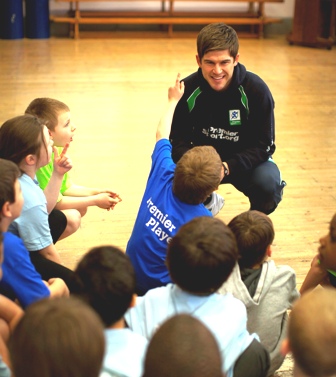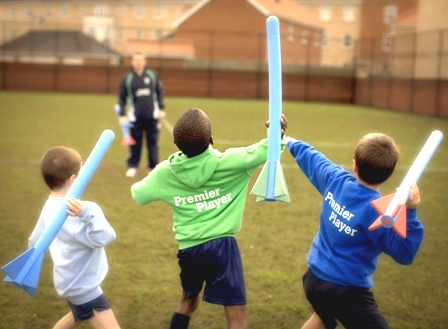
Premier Sport has 500 coaches in action across the country
A premier approach to sport
While debates about the best way to deliver sport in schools may be occupying academics, politicians and some parts of the media, The Leisure Review talked to David Batch of Premier Sport, a commercial company delivering high-quality coaching, sustainability and an exciting business model.

Premier Sport has 500 coaches in action across the country
It is a common complaint among the advocates of sport and sports development that the people with the greatest potential influence on young people’s early experience of sport and physical activity are often uncommitted and untrained. The people they speak of are the nation’s primary school teachers. Ever since Sue Campbell, now Baroness Campbell of Loughborough, started carting large red bags of equipment around the East Midlands, sports people have been trying to encourage education people to improve their approach to the delivery of what we have come to know as physical literacy. However, with the present government hacking away at the school sport partnership (SSP) network, the fear is that much of the past decade’s hard work on getting primary teachers more confident and competent in the delivery of physical education will be lost and pessimists speak of a generation driven further away from a healthy lifestyle, turned off by poor PE lessons, little after-school sport and a Gove-led return to competition for its own sake.
Despite this gloom, remedies are available to the open-minded. One such exists in the form of private sector coaching agencies putting coaches into school settings and, as the Youth Sport Trust (YST) SSP programme recedes and pressure on teachers’ time increases, it is a solution that has perhaps found its time. The largest provider of in-school physical activity and sport in England is Premier Sport whose chief executive, David Batch, is beginning to reap the benefits of 12 years experience providing “sports teaching and instruction in curriculum time, as well as after school, breakfast, lunch and holiday clubs”.
Batch began his working life in the world of lower league football, quickly moving from pitch to dug-out and achieving qualifications and positions of responsibility that belied his youth. Following a difference of opinion with the club manager over the definition of ‘development’, he left Cambridge United and, rather than re-enter the fray at another league club, set up Premier Sports. The company now deploys 500 coaches and delivers nearly 5,000 lessons to 125,000 children every week through its network of franchisees, all of whom, Batch explains, come from a wide variety of backgrounds. “Our franchisees can be sports people looking to develop a business doing something they love and have a passion for, or people with a business background who are massively into sport and want to translate what they do as a volunteer into a business,” he explained. What he insists they all share is a desire to “put something back in to their local community”.
Although Batch never uses the phrase ‘sports development’, his approach would place him firmly in that bracket, were he not delivering such a successful business model. Contrary to expectation, and flying in the face of the stereotypical image of fly-by-night soccer schools exploiting children’s love of all things football, he believes in sustainability and makes the case that a properly run business has greater longevity than any grant-funded enterprise: “We have never received a penny’s worth of public funding and would not survive if we were not delivering quality. We have worked on behalf of many organisations that do receive money from the public purse, which I think is a testament to our professionalism”.
That his organisation is thriving while others which relied on public funding are no longer part of the sports system is clear evidence that Batch is doing something right but isn’t the suggestion that he is contributing to the professionalisation and development of coaching somewhat far-fetched? “We are commercial because we are professional,” he counters. His argument is that fly-by-night operators are, by definition, short-lived and only by delivering and developing excellent coaches with rigorous operating standards and sensitive quality control could his operation be consistently commercially viable over more than a decade. Part of that viability is the development of a workforce that has evolved into a hybrid species. “We have to be more than just coaches going into schools,” he said. “We have to have a different skill set. Our staff have got to be able to deliver fit-for-purpose lessons and sessions that take children from foundation age right through to key stage 3 and beyond in some cases.”
Within that unique skill set Batch includes behaviour management and “training on what teaching is, as opposed to what coaching is”. He sees sports coaches learning to be like teachers and argues that a new role is being created which is “a profession on its own merits”. Part of the development of that profession and an indicator of its burgeoning importance has been the creation of a specific trade association and Batch has been instrumental in its genesis.
Styled “the community of providers of physical activity and sport”, COMPASS was formed initially by the three largest commercial providers and employers in the marketplace: SportsXtra, Fit For Sport and, of course, Premier Sport. The trade association will “represent and promote the interests of providers of services for physical activity and sport for schools and community groups, with commitment to industry-wide quality frameworks” and has already attracted the support of SkillsActive, the Association for Physical Education (afPE) and SportsCoach UK (scUK). With expressions of interest from over 100 suppliers of coaching services, including trusts, football clubs, school sport partnerships and schools, and dialogue established with government, it seems that COMPASS is set fair to achieve its broad aims of raising standards and informing purchasers of coaching of what they have a right to expect.
“People may say they are satisfied with the service they currently receive but I would ask against what benchmark are you judging?” Batch said. “By agreeing common standards we can inform headteachers and local authorities and say, ‘If you are going to have this, this is what it should look like.’” Batch argues that by establishing guidelines it becomes possible to monitor quality against a standard and, with negotiations already initiated with the insurance industry, the implication is that before long only those companies which meet those standards will find themselves insurable. In as litigious an environment as the school playground that development will be quite a driver.
With the national agency for coaching dealing with staffing cuts of up to 30% as this article goes to press and the UK Coaching Framework inexorably attaining the status of a footnote, the emergence of a trade association which will provide leadership and energy for at least one part of the physical activity and sport system must be welcome. That it is led and driven by people with the vision and acumen of David Batch is further cause for optimism. The future of far more than a few sports coaches may depend on it.
The Leisure Review, April 2011
© Copyright of all material on this site is retained by The Leisure Review or the individual contributors where stated. Contact The Leisure Review for details.
Download a pdf version of this article for printing
